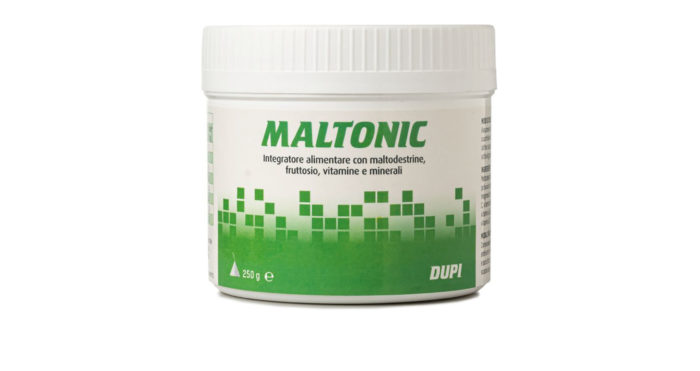Maltonic
It is a nutritional supplement with carbohydrates,vitamins and minerals.
Maltonic is useful in cases of intestinal irregularity hive, low calorie and low palatability of special food or oral rehydration solutions, the ORS.
Maltonic, thanks to its special formulation, can also be taken by pregnant women as a mineral supplement in cases of nocturnal leg cramps.
Maltonic is indicated as:
- fecal softener to regularize the intestinal and bowel to solve constipation in infants and infant
- calorie-carbohydrate supplement to meet increased energy demand of the child
- corrector special flavor to food such as milk hydrolyzate, soy, rice and oral rehydration solutions without inducing fermentation
Maltonic contains:
- maltodextrin and fructose in the ratio 7:3 with fecal rammollitore action in cases of functional constipation
- vitamins A, C and D that contribute to the normal functioning of the immune system
- vitamins B1, B2, B6 that contribute to the normal energy metabolism and the reduction of tiredness and fatigue.
Dietary supplements are not intended as a substitute for a varied diet, balanced and healthy lifestyle.
Maltonic has a very pleasant taste which facilitates their ingestion by children. Maltonic does not contain sucrose.
Dosage:
– 5 grams (1 teaspoon) as a sweetener
– 10 grams (2 teaspoons) as fecal softener or carbohydrate supplement
How to use: Take 5 grams (a teaspoon) in 100 ml of milk or water, one or more times per day.
Package: Powder of 250 g
Storage: Store at room temperature in a cool, dry place. Avoid exposure to sources of localized heat, direct sunlight and contact with water. The expiration date refers to the product properly stored. Any slight variation in color is not an indication of quality deterioration of the product. Do not throw out in the environment after the use.
Warnings: Do not exceed the recommended daily dose. Keep out of the reach of children under 3 years old. Dietary supplements are not intended as a substitute for diet, therefore it is recommended to follow a varied and balanced diet and healthy lifestyle.
Ingredients: Maltodextrin, fructose, potassium bicarbonate, magnesium citrate, vitamin C, vitamin B6, vitamin B2, vitamin B1, vitamin A, vitamin D3.
| Ingredients |
for 100 g |
for 20 g |
% RDA for ration |
| Energy |
380 kcal 1577 Kj |
76 kcal 315,5 Kj |
– |
| Protein |
– |
– |
– |
| Carbohydratesof whici sugar |
95 g 28,5 g |
19 g 5,7 g |
– – |
| Fat |
– |
– |
– |
| Dietary fiber |
– |
– |
– |
| Sodium |
– |
– |
– |
| Potassium |
280 mg |
56 mg |
4 |
| Magnesium |
220 mg |
44 mg |
12 |
| Vitamin c |
60 mg |
12 mg |
16 |
| Vitamin B6 |
2 mg |
0,4 mg |
28 |
| Vitamin B2 |
1,6 mg |
0,32 mg |
24 |
| Vitamin B1 |
1,4 mg |
0,28 mg |
24 |
| Vitamin A |
800 µg |
160 µg |
20 |
| Vitamin D3 |
5 µg |
1 µg |
20 |
Infant constipation
A study published in 2011 investigated the most common causes of constipation by taking into account a large sample of children during the first year of life. It was found that 15% of pediatric visits is due to constipation problems, the causes of which the most common are:
I. Allergy to milk proteins (72.8%)
II. Psychological factors (7.3%)
III. Anatomical defects of the digestive tract (4.4%)
SOURCE: Food allergy as a cause of constipation in children in the first three years of life-own observations. Kamer b, Dółka E. Med Wieku Rozwoj. 2011;15(2):157-61.
Magnesium
It was also shown that the magnesium is able to draw water from the tissues to the small intestine, thus stimulating the movements of the intestinal musculature, defined peristaltic movements. The mechanisms of action through which the magnesium acts are two:
- relaxes the intestinal muscles, stabilizing the normal rhythm of contraction
- draws water, softening the stool.
SOURCE: Magnesium – A Natural Solution for Constipation- http://www.nutritionalmagnesium.org/blog/371-magnesium-a-natural-solution-for-constipation.html
RELATED STUDIES: Magnesium is needed to boost vitamin D efficacy- http://www.nutritionalmagnesium.org/articles/nutrition/379-why
- CATEGORY For Children , For Mom , For Neonate
- TAGS

 Italiano
Italiano  English
English 